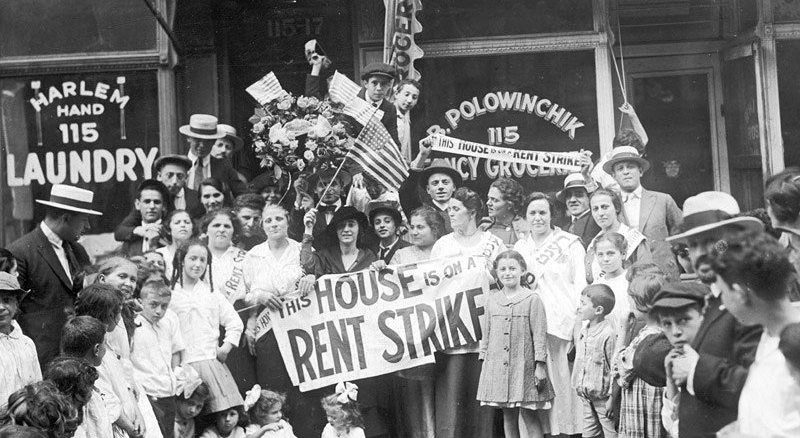By Manchester-based housing organisers
Every single landlord who tries to evict someone in the midst of a public health emergency, which is twinned with a profound housing crisis, needs to take a long, hard look at themselves.
In a recent article, The Landlord Law Blog questions whether it’s right for anti-eviction activists to target landlords.
Of course it is. It has always been good (and, sadly, necessary) to take direct action against those who dispossess people of their homes. We encourage you to watch this film, which includes some beautiful footage of East End tenants picketing their landlords’ homes and offices in the 1930s.
The landlords’ blog talks about a group of tenants who had protested outside the home of a landlord who had served an eviction notice after the occupiers had complained about disrepair.
The author claims that the landlord in question had (probably) acted within the law. The essential argument is that if what the landlords were doing was lawful, then the tenants can’t complain.
Well, protests are lawful, so landlords can’t complain.
The appeal to the law also doesn’t help the blog’s argument because the law is totally inadequate. The very notion of insecure short-term tenancies and ‘no fault’ evictions is obscene. The ‘retaliatory eviction’ legislation is barely worth the paper it’s written on. It’s hopeless to suggest that we shouldn’t take action against an act that is morally wrong on the basis that it was legally permissible.
In fact, it is precisely because landlords’ actions are lawful that tenants are forced to take action. The courts cannot protect us from section 21 notices, and we therefore have little alternative but to use political methods to try to change the landlords’ minds, or to humiliate and punish them for their cruelty in the hope that it will discourage others.
The landlords’ blog asks: why don’t we protest to the council? In the specific case discussed, it was presumably because it was the landlord who had broken the law by failing to keep the tenant’s home in good condition, while at the same time taking so much of their money. It’s absurd to suggest that the council’s failure to reprimand landlords for their own failings somehow makes the council more culpable.
And there is a direct relationship between the landlord and the tenant. As the blog correctly points out, it is the landlord who decides whether the tenant should be evicted. It is therefore entirely appropriate that – when a dispute arises – it will be the landlord and the tenant who confront each other. The council has nothing to do with it.
Today’s landlords and lettings agents are lucky. In a world of direct debits and emails there is very little personal contact between them and their tenants. Gone are the days when tenants could mob the rent officer: today’s ‘property professionals’ can cower behind their laptop screens, safely watching the value of their assets grow. We do not think that situation is sustainable.
Landlords should know this: for decades, you have taken our incomes and driven up the cost of homes. For decades, daytime TV shows have provided comfort by portraying you as benign adventurers in the bounteous terrain of the housing market. You have gained a vast amount of unearned wealth while we constantly face homelessness and poverty. You cannot expect us to treat you with courtesy or respect.
If you try to evict us, we will protest outside your homes – your secure, comfortable homes. It is in the nature of your grubby business that you make people homeless, and you have no right to complain when we kick against you. Rather than complaining that you can see a lawful protest out your window, be thankful that the bailiffs are not tearing your family apart and dragging them through the front door - yet …
2 November 2020





